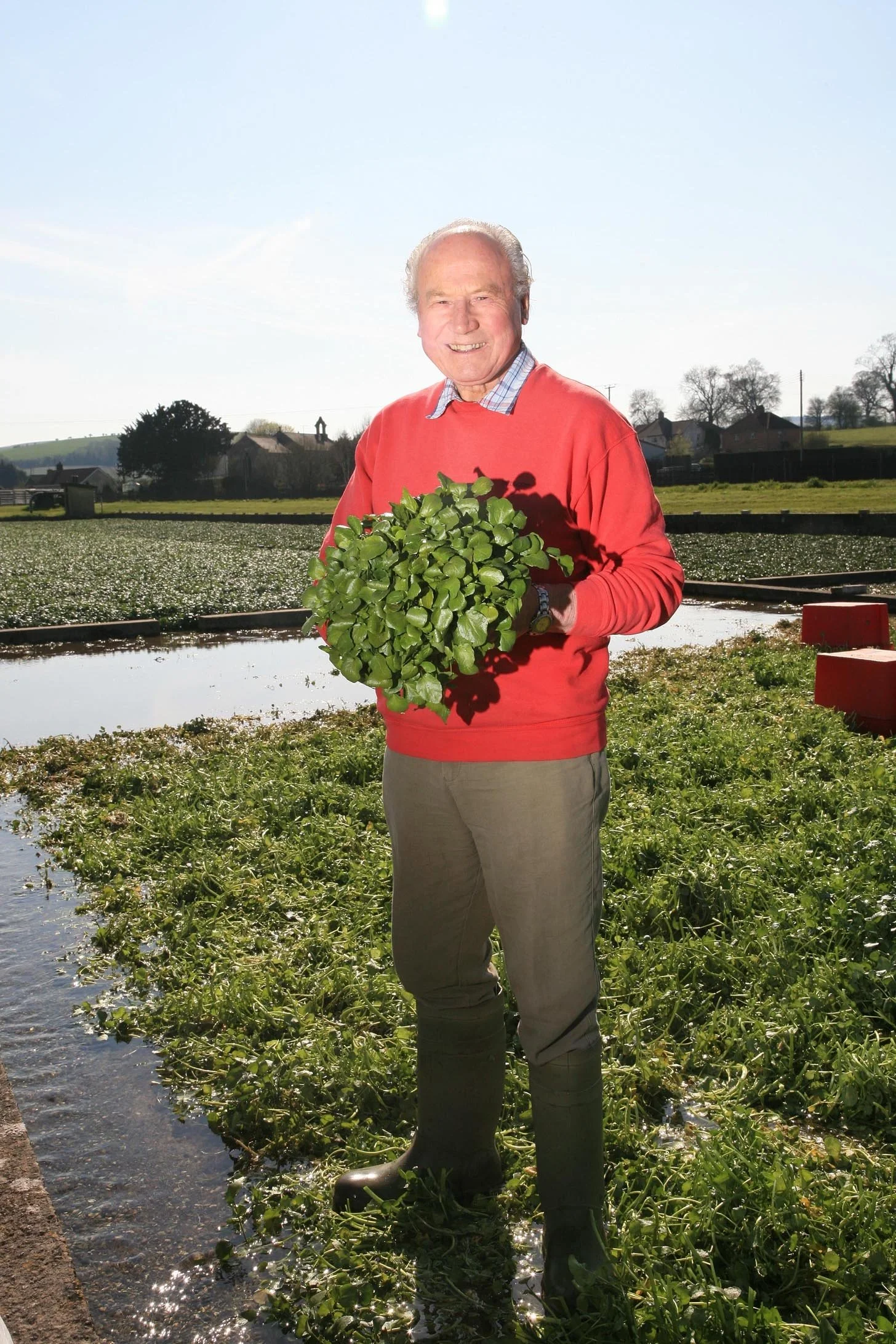Our History
Our family run business began with John Hurd starting the farm in 1953 following his departure from the national service and being given the land by his father. Over the next 30 years he worked to becoming a fully independent grower and supplier.
With the help of his son Simon they have worked together building the business into a modern operation both growing and packaging the Watercress on site. They have taken the business from not only supplying small retailers and wholesale markets but have been supplying Waitrose since 1996 as part of being able to reach a larger demographic for people to enjoy the taste and health benefits that come from Organic Watercress.
Below: How we used to harvest the Watercress with a knife by hand from 1953-2018. Although the traditional method very labour intensive and time consumer averaging four hours work each morning by half a dozen or more employees. Read more about watercress below.
Watercress is an excellent natural food. It contains more Vitamin C than fresh oranges and more calcium than cow's milk. It also contains iron and beta carotene, which the body converts to Vitamin A, as well as being a good source of Vitamin E.
In fact, it's one of the best 'ACE' foods available: Vitamins A, C and E are antioxidants which help to neutralise the harmful effects of 'free radicals' - chemicals produced by modern living that are all around us, and can damage our tissues without us knowing anything about it.
Disease Prevention
Watercress also contains high quantities of a substance called gluconasturtin. When chewed, this constituent of watercress releases another compound, phenylethylglucosinolate (PEITC). Scientists** working on cancer-prevention programmes have shown that PEITC can neutralise specific cancer- forming agents in tobacco smoke, during tests on human volunteers. This is the only research so far to have indicated a direct effect as a result of vegetable consumption. Its effectiveness is best released when the plant is chewed or pounded - the pesto recipe in this booklet is an ideal use.
Nutrition Information
Watercress contains per 100g (%RDA)*
Vitamin A 300 microgrammes (44%)
Vitamin C 60 mg (100%) (oranges 50mg/100g)
Vitamin E 10mg (10%)
Thiamin 0.1mg (8%)
Riboflavin 0.1mg (6%)
Nicotinic Acid 0.6mg (3%)
Iron 1.6 mg (11%)
Calcium 220mg (27.5% (cow's milk: 120mg/100g)
The many benefits of watercress have been recognised since ancient times. Roman Emperors ate it to help them make 'bold decisions'. Anglo-Saxons swore by watercress potage to 'spring-clean' the blood. Victorians thought the plant was a cure for toothache, hiccups and even freckles!
The juice pressed from watercress was used for gravies to accompany roast meats in medieval France.
In the earl 1800's watercress sandwiches were the traditional breakfast fare for London workmen. By 1808 demand was outstripping supply and proper cultivation of watercress began. Hampshire and the chalk belts of southern England, where clear spring waters rise from deep underground, offered perfect conditions for watercress. With the coming of railways, the watercress trade from Hampshire grew so much that the line between Alresford and London became known as 'The Watercress Line'.
Watercress sill thrives today in the mineral-rich waters drawn from chalk springs in the southern counties of England. It is a refreshing thought that the watercress we eat now is from a plant that has hardly changed since the days of the ancient Romans.
John Hurd and his family have been cultivating watercress for over forty years, when in 1992 he took the decision to go totally organic. He was awarded his first "Organic Certificate" in June 1994. In 1991, John Hurd installed the first National Rivers Authority approved settlement tank in the UK.
The tank allows silt and organic debris to settle before water is released, thus helping to maintain a natural balance in our rivers. Watercress beds are flooded and sluiced, ridding the product of pests, without the need for toxic pesticides.
Eight acres of watercress are under cultivation producing watercress all year round (subject to weather conditions).Hygiene and water purity in the cultivation of watercress is paramount. Mr Hurd was the first NFU approved "Organic Watercress" grower in the UK and also has approval from Organic Farmers and Growers and UKROFS.



